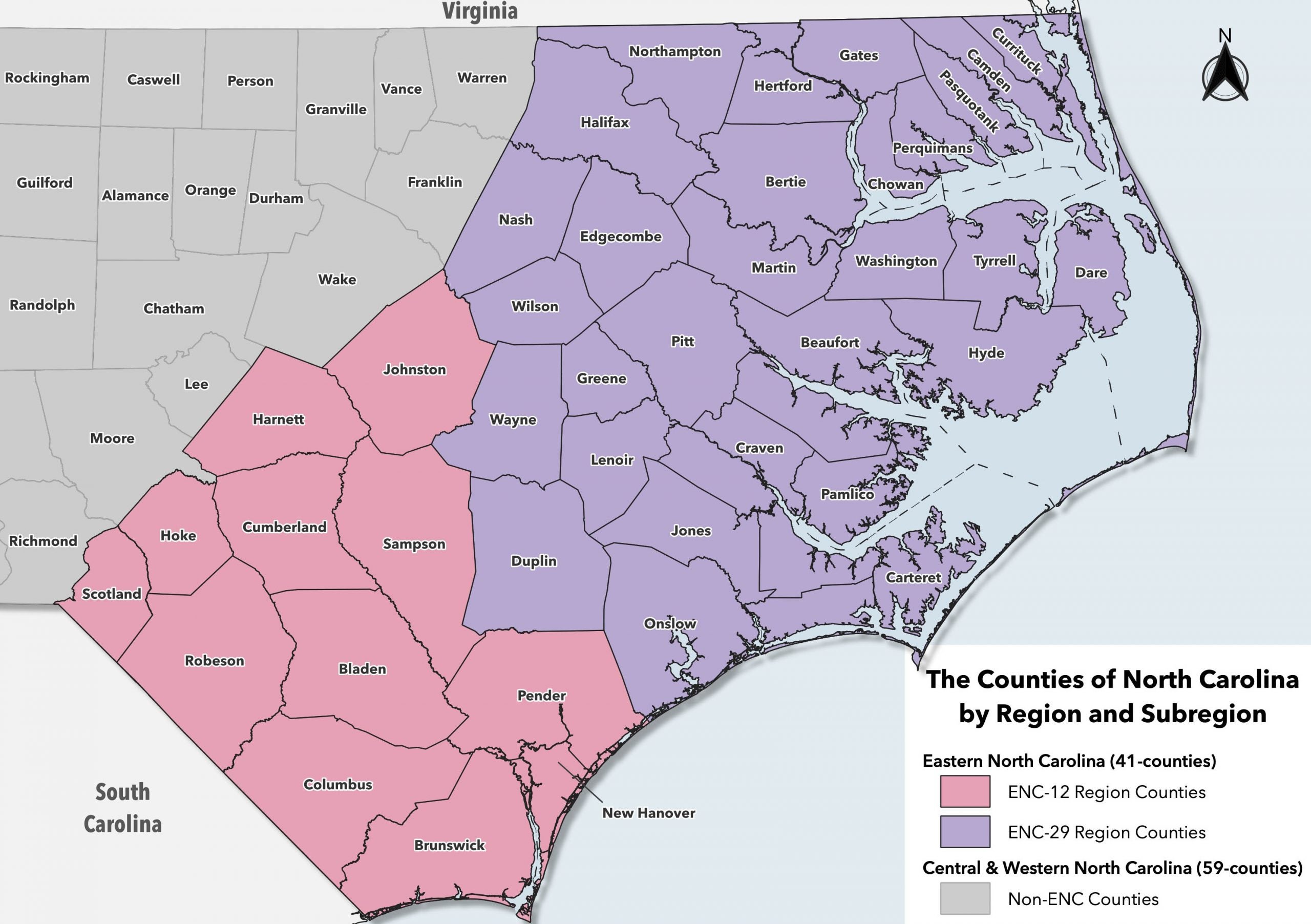ENHANCING ECU’S REACH
Grant for improving digital equity to impact 29 regional counties
East Carolina University is receiving $1.39 million for a collaborative project that aims to improve access to digital technology and literacy, resources and skills training for residents in 29 eastern North Carolina counties.
The project is funded by the State Office of Digital Equity and Literacy and led by Leslie Cofie, principal investigator and assistant professor of health education and promotion in the College of Health and Human Performance, and Alice Richman, co-principal investigator and professor of health education and promotion, along with ECU Health and Laupus Health Sciences Library.

A graphic produced by the ECU Center for Geographic Information Science highlights a 29-county subregion in eastern North Carolina to benefit from a $1.4 million grant to ECU from the State Office of Digital Equity and Literacy. (Graphic by ECU Center for Geographic Information Science)
A primary goal is to enhance the capacity of ECU as a center for bridging the digital equity divide experienced by rural and underserved communities in the region. Public libraries and trained community health workers will help facilitate technological needs and educational access to identified populations, which includes low-income households, individuals who primarily reside in a rural area, individuals with a language barrier, and community members who identify as Black, Indigenous and people of color.
Cofie and Richman estimate the eventual free deployment of 290 computing devices, 1,160 hotspots and 29 rugged internet hubs that libraries and communities will be able to keep after the completion of the two-year project.
“The issue at hand is we know access to digital technology and digital literacy is so important because it affects every aspect of our lives,” Cofie said. “We are trying to target communities that can benefit from these types of resources.”
Key support will come from Jamie Bloss and Amanda Haberstroh, representing Laupus Health Sciences Library, and Abby Schwartz from the ECU School of Social Work. ECU Health, the Care Share Health Alliance and Roanoke Chowan Community Health Center also are partners in engagement and supporting community health workers. Funds will help train community health workers, with plans for at least half of them to be bilingual in Spanish and English.
“One of the things I love about this project is the breadth and diversity of collaborators we brought together,” Richman said. “That’s not only at ECU, but with local community organizations. … We’re all coming together to provide education and resources around digital equity to a 29-county subregion. We’re delivering these services directly to the community, and we put together a really good group to be able to do that. That makes it exciting.”
This will build on previous collaborative research involving the College of Health and Human Performance and Laupus Library focused on farmworker health-related and digital access improvements.
The project is divided into three pillars — conduct formative evaluation of internet connectivity, technology and resource needs of communities; adapt and tailor existing digital literacy training and resources to meet the needs of eastern North Carolina while preparing community health workers to disseminate training materials and methods; and deliver digital technology and digital literacy training and resources to community members.
“This grant provides us the opportunity to continue previous outreach while supporting our colleagues in rural public library systems,” said Haberstroh, a librarian liaison to the ECU College of Nursing and graduate programs. “We are looking forward to this collaborative effort and are hopeful for the future of health information access through improved digital equity in eastern North Carolina.”
ECU’s award is part of $9.9 million in funding announced for the state’s first digital equity grant.
“Access to internet connectivity and any type of digital literacy is really crucial,” Cofie said. “Exposing community members to these skills and resources will go a long way in contributing to their ability to participate in any type of civic engagement or economic engagement or access to health information and resources, and even health care.”
Gov. Roy Cooper added in a state release, “All North Carolinians need the knowledge and the devices to safely access the internet. This first round of digital equity funding will help us build the foundation of the effort to make sure everyone can get online in an affordable way.”

North Carolina’s coastal counties will be a focus of the $1.39 million grant. (ECU photo by Rhett Butler)
